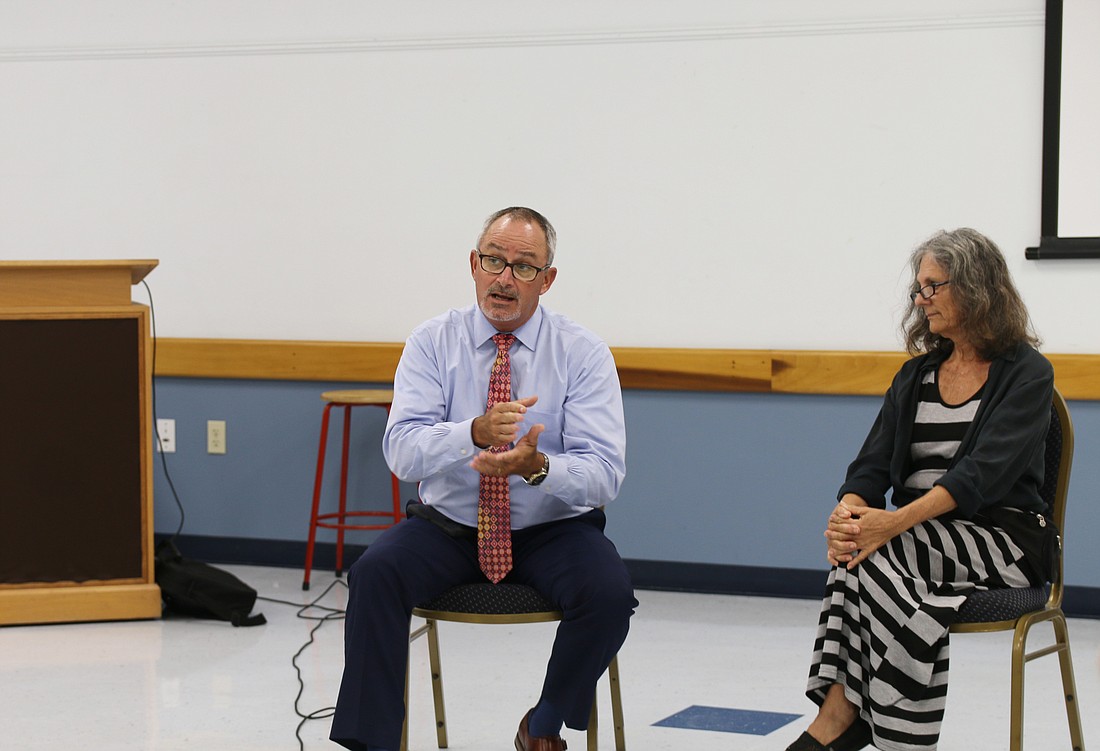- July 26, 2024
-
-
Loading

Loading

Smart growth is a balance between the economic, social and natural world, said Clay Ervin, Volusia County director of Growth and Resource Management, at the Civil Discourse town hall meeting on the subject on Monday, Aug. 26.
He told the estimated 25 people in attendance to picture a Venn diagram with the three components.
"Where you see all three of those circles meeting, that's in essence a sustainable community," Ervin said.
Smart growth has been a recent topic of interest in Ormond Beach, resurfacing during the 2018 municipal elections and becoming a cornerstone of many of the commission candidates' platforms. The conversation of what is defined as smart growth also revolved around upcoming development Granada Pointe, where a large swath of forest was clear-cut in early 2018.
The topic of smart growth will be discussed at the upcoming Volusia County Council meeting on Sept. 2 and the Roundtable of Volusia County Elected Officials on Sept. 9 at the Daytona Beach International Airport.
Ervin, who was the Ormond Beach planning director from 2002-2008, said that Ormond Beach is not the only city dealing with defining what smart growth is. It's happening across the nation, and comes down to people wanting their communities to remain "nice," he explained.
The goal of the smart growth definition Ervin gave is to protect natural resources for current and future sustainability, encourage economic growth to keep income in the community and ensure people have accessibility to education, healthcare, parks and clean areas. However, he said local governments still have to abide by Florida Legislature.
“We cannot just say no to every development that comes in," Ervin said.
If a development is being built on a road that isn't operating at optimal traffic standards, Ervin said developers have the right under state statute to pay impact fees to mitigate impact on that road. Local government can't stop growth, Ervin said.
“We would love to be able to say the world is black and white in the world of regulation, but you do need to offer opportunities so that we can work within them," Ervin said. "There is development that you do need.”
Ormond Beach resident Barry duMoulin asked Ervin if there was a point where city could reach a "saturation point." The former Ormond Beach City Commission Zone 4 candidate said that, at some point, that will lead to Ormond Beach losing its character.
“I don’t believe in the term smart development," duMoulin said. "It’s done with.”
He's a proponent, instead, for redevelopment, and cited the Ormond Renaissance Condominiums on Sterthaus Drive as an example. The condos are being built on the former Florida Hospital site.
Ervin said that when government designates land as commercial or residential in a future land use map, and assign zoning, then developers have the right to develop the land accordingly.
“I wish I was that much smarter so I can make ‘one-size fits all’ or knowing I’ve done it the right way the right time the first time," Ervin said. "Unfortunately, it’s not always the case. Each piece of property is different, just like every rule that can apply to can be different."
However, Ormond Beach has seen several rezoning hearings in the past few years, including Granada Pointe, the Starbucks on the beachside, the Extended Stay America project north of I-95 and upcoming Granada Central development by Reflections Village. These were all rezoned from different commercial zonings to Planned Business Developments.
Ervin said city and county planners are bound to the fact that the uses allowed in commercial zoning districts carry over to what they can be developed for. Unless there is a "blatant" issue, it's hard to differentiate between commercial uses, he said.
The burden lies in the elected officials to prove that a special exception, or overall development, does or doesn't comply with the respective standards, depending on the issue, Ervin said.